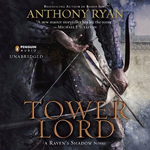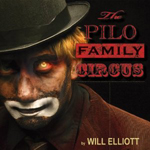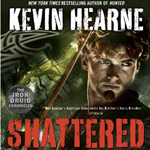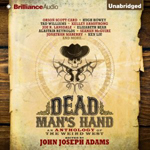
 Metro 2033
Metro 2033
By Dmitry Glukhovsky; Performed by Rupert Degas
Publisher: Brilliance Audio
Publication Date: 19 November 2013
[UNABRIDGED] – 21 hours
Themes: / disaster / nuclear / post-apocalypse / underground tunnels / survival /
Publisher summary:
The year is 2033. The world has been reduced to rubble. Humanity is nearly extinct and the half-destroyed cities have become uninhabitable through radiation. Beyond their boundaries, they say, lie endless burned-out deserts and the remains of splintered forests. Survivors still remember the past greatness of humankind, but the last remains of civilisation have already become a distant memory. Man has handed over stewardship of the Earth to new life-forms. Mutated by radiation, they are better adapted to the new world. A few score thousand survivors live on, not knowing whether they are the only ones left on Earth, living in the Moscow Metro—the biggest air-raid shelter ever built. Stations have become mini-statelets, their people uniting around ideas, religions, water-filters, or the need to repulse enemy incursion. VDNKh is the northernmost inhabited station on its line, one of the Metro’s best stations and secure. But a new and terrible threat has appeared. Artyom, a young man living in VDNKh, is given the task of penetrating to the heart of the Metro to alert everyone to the danger and to get help. He holds the future of his station in his hands, the whole Metro—and maybe the whole of humanity.
Without question, I would recommend this book. I strongly suggest you listen to the audiobook. You might feel a little bummed at the end, but the writing is strong enough to support its fumbled conclusion.
Dmitry Glukhovsky’s Metro 2033, book 1 in the Metro Series, offers an interesting take on the travel/road narrative. Draw your own academic conclusions, but for the most part, humans yet blindly stumble in the dark, face self-inflicted nuclear/biological disaster, and unseen things are hungry. But worry not; man yet possesses fire, fear, weapons, and hatred. What we do not possess appears to be an accurate map, foresight, or the ability to think outside our own skull.
I reveled in the atmosphere. A bunch of people crammed into underground tunnels, forced to keep watch by firelight, eating mushrooms, pork, and rodents, became nearly a corporeal experience. Different metro stations setting up their own community, the need for passports for those wishing to travel between stations, and the various creation/destruction myths surrounding each group, delivers a strong sense of fractured and desperate realism.
The story is okay, but for me, the writing is what shined brightest. The only character I felt remotely invested with was a man named Hunter. The other players in this tale, while multifaceted to a degree, lacked a depth and drive that I feel is paramount for memorable characters worth investing in. I loved the library excursion. So good! Really wished there’d been more story in this setting. The scene with the librarian playing with the flashlight was surprisingly moving.
As the narrator, Rupert Degas is amazing. His rhythm and talents for infusing mood into speech takes flight in this reading. I can’t speak for the accent accuracy, but I can tell you that Degas’s delivery drew me in and made me feel the darkness.
Posted by Casey Hampton.
 Tower Lord (Raven’s Shadow #2)
Tower Lord (Raven’s Shadow #2) Pilo Family Circus
Pilo Family Circus Caves of Steel (Robots #1)
Caves of Steel (Robots #1) Shattered (The Iron Druid Chronicles, #7)
Shattered (The Iron Druid Chronicles, #7) Dead Man’s Hand: An Anthology of the Weird WestEdited by John Joseph Adams, by various (see table of contents below)
Dead Man’s Hand: An Anthology of the Weird WestEdited by John Joseph Adams, by various (see table of contents below)